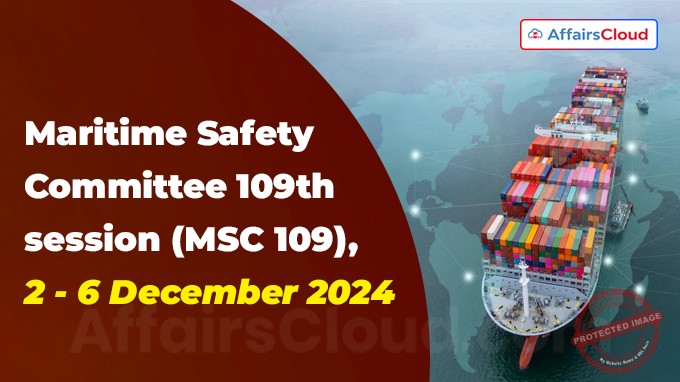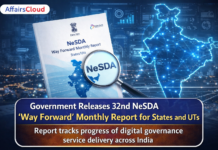 The Maritime Safety Committee (MSC) conducted its 109th session from 2nd December to 6th December 2024 at the International Maritime Organization (IMO) Headquarters in London, United Kingdom (UK).
The Maritime Safety Committee (MSC) conducted its 109th session from 2nd December to 6th December 2024 at the International Maritime Organization (IMO) Headquarters in London, United Kingdom (UK).
- The meeting was chaired by Mrs. Mayte Medina of the United States, supported by Vice-Chair, Capt. Theofilos Mozas of Greece.
- The session approved interim guidelines on the safety of ammonia-fueled ships which will lead to wider adoption of ammonia as a marine fuel.
Amendments to mandatory instruments
Ammonia cargo as fuel (IGC Code)
MSC 109 adopted amendments to Paragraph 16.9.2 of the International Code for the Construction and Equipment of Ships Carrying Liquefied Gases in Bulk (IGC Code) so that ammonia can be used as fuel on ammonia carriers.
- The amendments will enter into force on 1st July 2026.
Safety of ships using natural gas as fuel (IGF Code)
i.MSC 109 adopted amendments to the International Code of Safety for Ships Using Gases or Other Low-flashpoint Fuels (IGF Code), on the basis of experience with the code since it came into force in 2017.
ii.The amendments will come into force on 1st January 2028.
Goal-based new ship construction standards
Goal-based standards (GBS) for the new construction of bulk carriers and oil tankers are, the IMO’s rules for class rules.
- Under the GBS, IMO auditors use guidelines to verify the construction rules for bulk carriers and oil tankers of class societies acting as Recognized Organizations
North Atlantic wave data
i.MSC 109 noted that International Association of Classification Societies (IACS) is currently undertaking a review of its Common Structural Rules (CSR) for bulk carriers and oil tankers to analyze developments in data, materials, technologies and calculation methodologies.
- The CSR are implemented in the individual class rules of the IACS members, which are to be followed with the GBS.
ii.The IACS has now issued a revision of the North Atlantic wave data to ensure more scientific data as a basis for the rule formulas in the CSR.
Maritime autonomous surface ships (MASS)
i.The IMO has agreed to develop a non-mandatory, goal-based code for cargo MASS, which will be implemented as a mandatory code upon experience with its application.
- The purpose of the code is to provide a structure to address both the remote control and the independent operation of key functions.
ii.The non-mandatory MASS Code is expected to be finalized by 2026, followed by an experience-building phase after its adoption. A mandatory code is expected to enter into force on 1st January 2032, at the earliest.
- The non-mandatory MASS Code will be developed in a Correspondence Group until MSC 110 (June 2025).
New technologies and alternative fuels
Identification of gaps in current IMO instruments
i.MSC 109 agreed upon the use of potential alternative fuels and new technologies to support the reduction of GHG emissions from ships with an aim to identify safety obstacles, barriers, and gaps in the current IMO instruments that may obstruct the use of various alternative fuels and new technologies.
ii.MSC 109 agreed to add “swappable traction lithium-ion battery containers” to the list of alternative fuels and new technologies.
- It includes fuels and technologies such as ammonia, hydrogen, fuel cell power installations, nuclear power, solar power, wind power, lithium-ion batteries, and supercapacitor energy storage technology.
Application of the IGF Code
MSC 109 agreed to make changes to SOLAS to clarify that the IGF Code applies to ships using gaseous fuels, whether they are low-flashpoint or not.
- The draft amendments are expected to enter into force on 1 January 2027, subject to adoption by MSC 110 (June 2025).
Maritime cyber risk management
MSC 109 recognized the importance of cybersecurity standards for ships and port facilities and invited proposals for suggesting ways to enhance maritime cybersecurity.
Ship systems and equipment
- Average mass of a person during lifeboat testing – the average mass of a person should be 75 kilograms for lifeboats intended for passenger ships and 82.5 kilograms for lifeboats intended for cargo ships.
- Pressure-vacuum valves on cargo tanks in tankers – introducing a maximum leakage rate from pressure-vacuum valves. The circular will apply to devices installed on or after 6th December 2026.
- Minor correction to MSC.1/Circ.1276/Rev.1 – the Unified Interpretation related to exhaust ducts from galley ranges was intended for passenger ships carrying more than 36 passengers.
- Correction of references to structural fire protection tables- The amendments are expected to take effect on 1 January 2028.
Navigation, communications, search and rescue – check repo
Digital navigational data system (NAVDAT)
MSC 109 adopted performance standards for the NAVDAT system and changes to Resolution MSC.509(105) on “Provision of radio services for the Global Maritime Distress and Safety System (GMDSS).”
- NAVDAT is used for broadcasting digital data, including maritime safety information (MSI) and search and rescue (SAR)-related information on medium frequency (MF) and high frequency (HF) bands from shore to ships.
Mobile satellite communication services in the GMDSS
MSC 109 approved a revision of the “Criteria for the provision of mobile satellite communication systems in the Global Maritime Distress and Safety System (GMDSS)” on the basis of experience gained when open for multiple recognized mobile satellite providers in the GMDSS.
- The new resolution will cover both new and already approved GMDSS Mobile Satellite Service providers. The resolution is expected to be adopted by the Assembly in December 2025 and enter into force immediately thereafter.
Safety of pilot transfer arrangements
MSC 109 approved a draft revision of SOLAS Regulation V/23 and associated performance standards for pilot transfer arrangements to ensure safe arrangements for pilots and other personnel embarking and disembarking ships in all conditions of draught and trim.
- The draft amendments are expected to enter into force on 1st January 2028, subject to adoption by MSC 110 (June 2025).
Validity of radiocommunications equipment
The mandatory Very high frequency (VHF)/ Digital Selective Calling (DSC) equipment required by SOLAS Regulation IV/7 on radio equipment (including the required duplicated equipment for maintenance purposes) should follow the latest channel arrangements in Appendix 18 of the Radio Regulations by the first radio survey scheduled on or after 1 January 2028, or earlier.
Guidance on implementation of Cape Town Agreement
MSC 109 approved interim guidance to support implementation of the Cape Town Agreement.
- The Cape Town Agreement (CTA) sets minimum requirements on the design, construction, equipment, surveys, and certification of fishing vessels of 24 meters in length and over, or equivalent in gross tonnes.
- The agreement has now been ratified by 22 states, with a combined fleet of about 2,600 fishing vessels.
Captain Ian Finley receives International Maritime award
Captain Ian Finley, Permanent Representative of the Cook Islands, was awarded with the prestigious International Maritime Prize for 2023 at the annual IMO Awards Ceremony, held in London on 2nd December 2024.
- As a delegate to IMO, representing Panama and latterly the Cook Islands, he has contributed majorly in the development of virtually all safety, environmental and legal legislation adopted by the Organization since Captain Jorge Fernando Galaviz Fuentes and the crew of the tugboat Pemex Maya were recognized for their heroic efforts during Hurricane Otis, a category five storm that hit Mexico’s Pacific coast on October 25, 2023..
Crew Of Tanker & Tugboat Wins Exceptional Bravery At Sea 2024 Award
i.The IMO awarded the 2024 Exceptional Bravery at Sea Award to the Captain and crew of the oil tanker Marlin Luanda and the Captain and crew of the tugboat Pemex Maya.
- Captain Avhilash Rawat and the crew of the Marlin Luanda were recognised for their exceptional courage and leadership when an uncrewed aerial device struck the tanker on 26th January, 2024.
- Captain Jorge Fernando Galaviz Fuentes and the crew of the tugboat Pemex Maya were recognized for their heroic efforts during Hurricane Otis, a category five storm that hit Mexico’s Pacific coast on 25th October, 2023.
ii.Certificates of commendation were also awarded to Captain Jerôme Noël Mougoula Saguiliba and Lieutenant Crépin Manfoumbi Mengara for their roles in the rescue operations after the sinking of the passenger ferry Esther Miracle off the coast of Gabon in March 2023.
About International Maritime Organization (IMO):
Secretary-General – Arsenio Dominguez
Headquarters – London, United Kingdom (UK)
Founded– 1948




